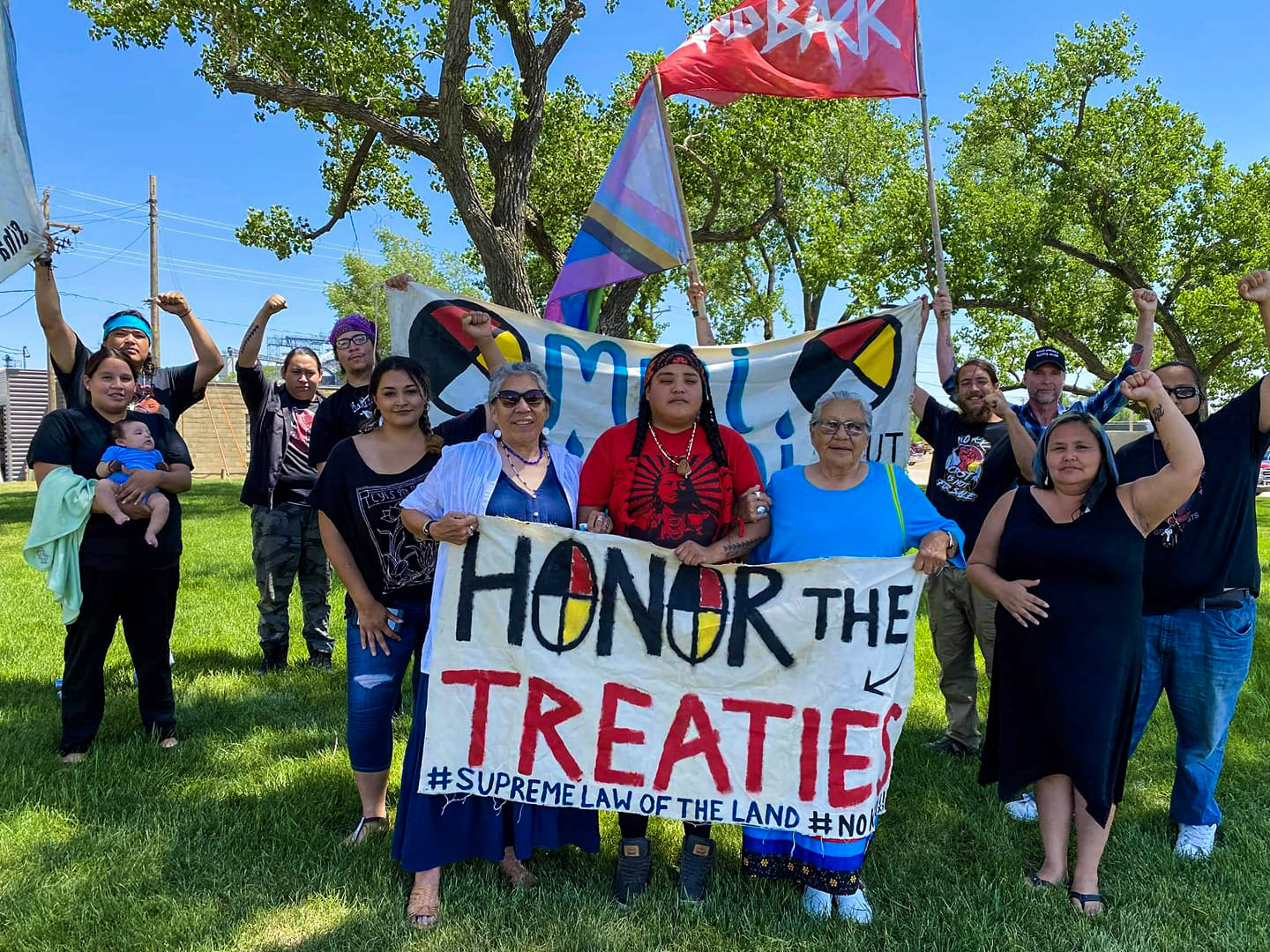
Sure enough: An announcement from corporate headquarters June 9 stated, “The company confirmed today that after a comprehensive review of its options, and in consultation with its partner, the Government of Alberta, it has terminated the Keystone XL Pipeline Project.” All 1868 Fort Laramie Treaty tribes, as well as the National Congress of American Indians, are on record in opposition to KXL. TC Energy Corp., previously TransCanada Corp., gave up the ghost one-half year after U.S. President Joe Biden’s inaugural day revocation of KXL’s presidential permit. During that sixth-month period, the company continued seeking local easements. Native pipeline fighters remained on alert, monitoring activity at supply and construction facilities to prevent permit violations along the soon not-to-be-built pipeline section from Canada through Montana and South Dakota to Nebraska.‘It’s a great day for Mother Earth’: It took over 10 years and three presidential administrations but tribes and Native activists can finally claim victory over the Keystone XL Pipeline. #NoKXL https://t.co/3sJysCVUFy
— indianz.com (@indianz) June 10, 2021
The company will “continue to coordinate with regulators, stakeholders and Indigenous groups to meet its environmental and regulatory commitments and ensure a safe termination of and exit from the project,” TC Energy Corp. promised in its announcement. That same day, a judge for Haakon County in Philip sentenced Cheyenne River Sioux tribal member Jasilyn Charger, 25, for locking herself to a KXL pump station in a November 21 act of civil disobedience to delay construction. Charger will serve six months’ probation and pay a fine for trespassing on her treaty land. “It hurt a lot to be talked to like I had no right to this land and that what I did was wrong,” Charger said of the sentencing. “The courts will never be on our side as long as our treaty rights are not recognized.” She thanked her moral supporters and remarked to her followers, “Today we celebrate a death of a black snake, KXL.” The judge postponed sentencing for Cheyenne River Sioux tribal member Oscar High Elk, 30, until July 7 on charges stemming from police activity December 23 at the Rootz Camp he co-founded on the KXL route. High Elk raised $10,000 cash bond for his release from Haakon County Jail on Jan. 6. He faces one first-offense felony charge, as well as 11 misdemeanor claims, which could result in a prison sentence of nearly two dozen years and fines up to $48,000. At Cheyenne River Sioux tribal headquarters in nearby Eagle Butte, jubilation over the news of the pipeline’s demise was evident immediately during a No KXL Victory Gathering in the streets, where a convoy of vehicles — horns honking and flags flying — played traditional drum songs at high volume while occupants cheered. Cheyenne River Sioux Tribal Chair Harold Frazier bolstered the akeesha shared across Oceti Sakowin homelands and beyond, saying, “I would like to thank all the people who sacrificed, stood up, took action, worked and prayed to protect our nation and Unci Maka. “To the countless water protectors who have fought the constant battles in a thousand places to defeat this existential threat to us all, every action you took was an answer to a prayer,” Frazier said. “I would like to thank United States President Joseph Biden for understanding the damage to this planet projects like this would cause and cancelling the permit needed to cross the medicine line with Canada,” he added. “An acknowledgement of the importance our actions have to this planet was provided when you took the bold step of action making you a champion for all of us.”The fight against #KXL is not completely over. There are water protectors who still face charges for standing against the dirty tar sands pipeline.
— Indigenous Environmental Network (@IENearth) June 9, 2021
Donate what you can to Oscar High Elk's legal fund. https://t.co/AQ9PTozwLK pic.twitter.com/NlNBCTaz7M
He called the resistance “a long fight,” saying, “Pipelines continue to threaten our treaty territory, water and relatives, and we must not forget those that are still standing on sacred ground in front of giant enemies. Let today be an example of what is possible when we take action to change the course of history for the better.” His meaning about giant enemies was well received by thousands of Enbridge Energy Inc. Line 3 pipeline opponents, mobilized at the Mississippi Headwaters for a weeklong Treaty People Gathering in the Anishinaabe ancestral lands of Northern Minnesota. Their goal was to convince the Biden Administration to detain the Canadian company’s construction. (See story this issue by Darren Thompson.) “While there is victory today in the KXL fight, people continue to risk their lives and freedoms at Enbridge Line 3,” said Nick Tilsen, NDN Collective president and CEO, who attended the Line 3 gathering. Jade Begay, Climate Justice Campaign director for the NDN Collective, added: “The end of KXL is an affirmation that persistence works, that intersectional organizing works, and that when we center our efforts in our Indigenous values and in our respect for water, land, and our people, we win. I pray this victory will invigorate organizers and water protectors across the country — who are currently fighting DAPL, Line 3, Line 5, and other harmful pipelines that threaten communities of color, water, and land — to keep persevering.”Pipelines continue to threaten our treaty territory, water and relatives and we must not forget those that are still standing on sacred ground in front of giant enemies. @CRSTChairman #HonorTheTreaties #MniWiconi #NoKXL #NoDAPL #StopLine3 https://t.co/8nX4Mizb7M
— indianz.com (@indianz) June 11, 2021
Rosebud Sioux Tribe President Rodney M. Bordeaux responded to the KXL announcement, “This is great news for the tribes who have been fighting to protect our people and our lands. The treaties and laws guarantee us protections, and we are committed to see that those laws are upheld.” The Rosebud Sioux Tribe announced a June 15 Wopila and Celebration with lunch to feature speakers Russell Eagle Bear and Paula Antoine, founder of the Rosebud Sioux Tribes Oyate Wahacanka Woecun (Shield the People) Spirit Camp on the KXL Pipeline route. Established in 2014, it was the first of dozens more of its type to muster prayer and popular opposition in the anti-pipeline movement.The Trump administration lives on in these zombie pipelines. Time to drive a stake through them!https://t.co/GQMTagIbGC
— Bill McKibben (@billmckibben) May 21, 2021
NATIVE SUN NEWS TODAY
Support Native media!
Read the rest of the story on Native Sun News Today: The death of the ‘Zombie Pipeline’
Contact Talli Nauman at talli.nauman@gmail.net
Note: Copyright permission Native Sun News Today
Harold Frazier: Pipelines continue to threaten our treaty territory (June 11, 2021)
‘A great day for Mother Earth’: Tribes welcome demise of Keystone XL Pipeline (June 10, 2021)
‘Shut down DAPL’: Lakota youth bring black snake to Biden’s front door (April 2, 2021)
‘She even protested the Dakota Access Pipeline’: Deb Haaland #DebForInterior (March 11, 2021)
Doug George-Kanentiio: Deb Haaland blazes trails for all of Indian Country (March 10, 2021)
Cronkite News: Deb Haaland shares her vision for Interior Department (March 1, 2021)
Recap: #DebForInterior confirmation hearing (February 24, 2021)
Deb Haaland finally lands confirmation hearing to be Secretary of the Interior (February 17, 2021)
Montana Free Press: Republican tries to revive Keystone XL Pipeline (February 9, 2021)
Native women win major award for ‘Water Protectors’ book (January 27, 2021)
Day 1 of the Joe Biden administration: Actions affecting Indian Country (January 20, 2021)
Schedule for Joe Biden inauguration and first actions in office as president (January 20, 2021)
Lakota leader Tom Poor Bear dies after battle with COVID-19 (December 17, 2020)
Native Sun News Today: Native activists hold Joe Biden to campaign promises (December 7, 2020)
Native America Calling: Treaties more than a century old provide both guidance and constraints
Native America Calling: Language revitalization: apps, games, and classroom lessons help keep Native languages vital
House Subcommittee on Oversight and Investigations holds hearing on cartels in Indian Country
Native America Calling: Tribal broadcasters scramble; Native higher ed leaders fight to keep funding
‘We’re frustrated’: Lawmakers press Indian affairs nominee on key issues
Cronkite News: Fires cause problems for Grand Canyon’s tourist economy
Press Release: Oklahoma City Indian Clinic receives health awards
AUDIO: Confirmation hearing for William “Billy” Kirkland to be Assistant Secretary for Indian Affairs
VIDEO: Confirmation hearing for William “Billy” Kirkland to be Assistant Secretary for Indian Affairs
NAFOA: 5 Things You Need to Know this Week (July 21, 2025)
Press Release: National Congress of American Indians continues to oppose racist imagery in sports
Chuck Hoskin: Cherokee Nation prepares for the future of public safety
Native America Calling: Tribes confront resource-intensive drive of Artificial Intelligence
Statement: Corporation for Public Broadcasting on elimination of federal funding
More Headlines
